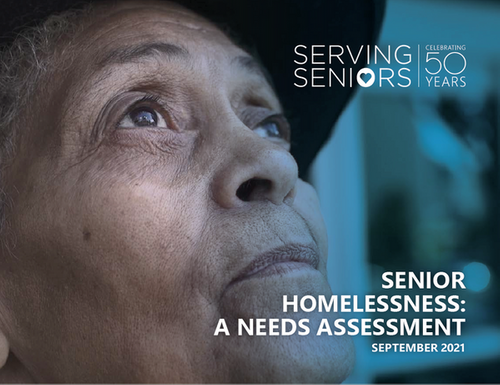 By Gayle Lynn Falkenthal
By Gayle Lynn Falkenthal
September 11, 2021 (San Diego) -- One in four of San Diego’s homeless adults is over the age of 55. More than 40% are experiencing homelessness for the first time in their lives.
Serving Seniors has exclusively served San Diego’s low-income, older adult population for 51 years. In collaboration with the Regional Task Force on Homelessness and allied community organizations, Serving Seniors undertook formal research of older adult homelessness to grasp its true nature and identify more effective support services and solutions.
The report released today, Senior Homelessness: A Needs Assessment, reveals significant differences working with older adults experiencing homelessness as compared to the general adult homeless population. The corresponding solutions must be crafted to specifically address this distinct population. The report is now available on the Serving Seniors website.
“Most homelessness studies feel like there is a train heading toward you,” said Paul Downey, President/CEO of Serving Seniors. “Instead, we see a ray of hope in these recommendations. While realistic about the scope of the problem there are readily achievable solutions we can implement immediately at low-cost in an older adult’s lifetime. Seniors at risk of homelessness today don’t have the time to wait for another committee to come up with new programs.”
“The release today of the Serving Seniors Needs Assessment Report gives us particular insight into our senior community,” said Nathan Fletcher, chairman of the San Diego County Board of Supervisors. “Reports like this can guide and focus our efforts to tailor a variety of solutions. We know this population is different because of the work that’s been done here.
“The way a society cares for its elders says a lot about who we are as people – which tells me we have to do better. Even modest amounts of help can bridge the difference,” added Chair Fletcher.
Key findings in the report:
- Many older adults become homeless because they lack an economic safety net. They suffer catastrophic events with dire financial consequencs.
- More than half (56%) of those interviewed report an additional $300 or less of monthly income would increase their rent security.
- Some interview participants reported avoiding shelters due to safety concerns including risk of theft and physical harm.
- Less than half (45%) of service providers surveyed receive gerontological training or are required to have knowledge of/experience with older adults.
- Interviewed older adults reported struggling with technological barriers, transportation, and mobility limitations which limit their access to programs and services.
Among the recommendations in the report to address the findings:
- Leverage diversion programs to stabilize the economic circumstances of older adults in order to prevent a loss of housing and their entering a cycle of homelessness.
- Remove technological barriers by providing low-tech solutions and complimenting case management services with basic technology training and support.
- Expand the shallow-subsidy programs in place for older adults at-risk of homelessness and establish a permanent financial subsidy program for older adults.
- Address transportation and mobility barriers which prevent access to available services. Expand the availability of mobile or virtual service providers.
- Dedicate separate spaces in shelters with increased security, oversight, and age-friendly accommodations and policies for older adults.
- Provide gerontological (age-related) training to service providers. San Diego has an abundance of aging experts and collateral material that could be leveraged to provide quality training to homeless service providers. A primary example is San Diego County’s Aging and Independence Services (AIS).
Sylvia Martinez of San Diego became homeless in 2010 after a medical issue and workplace downsizing caused job loss. She returned to college but was unable to find a job. She exhausted her resources and eventually began living in her car. “We don’t all have mental health or substance abuse issues. We don’t lack skills to find a job. We lack support … I’ve experienced it all. I’ve seen the things our system is missing.” Martinez now lives at the Potiker City Heights Senior Residence after waiting ten years for Section 8 (low income) housing support.
“The number of homeless older adults is projected to triple over the next decade. We must take immediate action to address this growing crisis. It is a matter of health and safety, and the time is now,” said Tamera Kohler, President/CEO of the Regional Task Force on Homelessness.
Serving Seniors intends the report to foster a greater understanding of the direct experience of seniors facing homelessness, and to initiate broader discussions on how to invest in practical, immediate and permanent solutions to homeless services infrastructure to benefit San Diego’s low-income seniors today - not tomorrow when it is too late.
About Serving Seniors
Founded in 1970, Serving Seniors is a 501(c)(3) nonprofit organization based in San Diego, California, dedicated to serving low-income adults aged 60 and over. A leader in senior advocacy and programming, Serving Seniors has created an innovative model of comprehensive services including nutrition meals, housing, health and social services and lifelong learning opportunities to hundreds of seniors in need. It is the largest provider of meals to seniors in the county, and one of the only organizations in the nation providing such a robust range of services to vulnerable, at-risk older adults.
Serving Seniors President and CEO Paul Downey has been instrumental in the organization’s growth over the past 25 years. Since being appointed the role in 1995, Downey has guided the nonprofit’s innovative efforts to provide supportive services focused on keeping low-income seniors healthy and independent. Under Downey’s leadership, Serving Seniors has grown to provide more than 1.7 million nutritious meals and coordinated services to 6,490 older adults each year. Follow Serving Seniors on Facebook @ServingSeniorsSD, Instagram @servingseniorssd and Twitter @ServingSeniors.








Recent comments